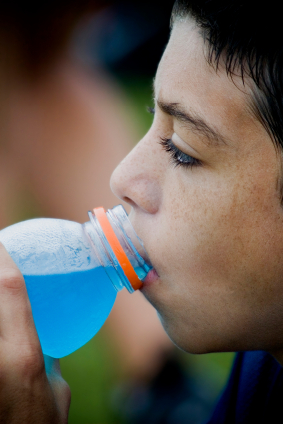 The following article is originally from our ‘Cricket question of the month’ section; where readers were able to write in with their cricket related questions each month.
The following article is originally from our ‘Cricket question of the month’ section; where readers were able to write in with their cricket related questions each month.
We are not offering this service any longer, but please contact us if you have any questions, or check out our FAQs section for more ideas.
Paul Yesberg from Christchurch asks:
“Our 16 year old lad has suffered from heat exhaustion/dehydration and asthma over a long period of time. He is a fast bowler and opening batsman as well as being the Captain of his schools 1st 11 team. Should he be using sports drinks and if so in what quantity?”
–Paul Yesberg, Christchurch
Water is the fluid of choice for hydrating children however the choice of fluids depends on the age of the child, the length of play and climatic conditions at the time.
Issues to consider
Young children and adolescents are not little adults – dehydration can be a real problem for young athletes because:
- Exercise results in increased body heat and young people produce more metabolic heat per mass unit than adults during activities such as walking and running. Unless this extra heat is released, core body heat will rise and may cause heat-related illness.
- They have a greater surface area to body volume ratio which makes it more difficult for them to regulate their body temperature as they are more affected by environmental conditions- particularly humidity, wind and altitude.
- Their ability to transfer heat from the centre of the body to the skin by blood is less effective and young people sweat less than adults. The other concern for them is that kids often dehydrate voluntarily – they don’t always drink even when a drink is put in front of them.
- In hot weather children need to be reminded to drink because thirst is not a good indicator of dehydration and even as much as 1-2% of dehydration can reduce their performance.
The likelihood of heat intolerance increases conditions that are associated with excessive fluid loss (febrile state, gastrointestinal infection, diabetes insipidus, diabetes mellitus), suboptimal sweating (spina bifida, sweating insufficiency syndrome), excessive sweating (selected cyanotic congenital heart defects), diminished thirst (cystic fibrosis), inadequate drinking (mental retardation, young children who may not comprehend the importance of drinking), abnormal hypothalamic thermoregulatory function (anorexia nervosa, advanced under-nutrition, prior heat related illness), and obesity.
In your son’s case, asthma can be triggered by over exerting and associated increase in metabolic rate and demand for fluids.
In The Coaches Edge (Issue 18, Jan 2003) Prof. E. Randy Eichner for the GSSI warns coaches about heat stroke and advices coaches to think “beyond fluids”.
- Over-motivated athletes can overheat by doing too much, too fast or by enduring too long. During a hard practice on a hot day, the “never-quit” mentality can work against an athlete.
- Lack of acclimatisation is a cardinal predictor of heat stroke. Getting heat-fit takes time.
- The causes of heat stroke can be cumulative. In studying 1,454 cases of heat illness in U.S. marines, researchers implicated heat stress on the prior day as a factor. So a prime time for heat stroke is the day after an exhausting and dehydrating day in the heat. (Note: that was the results from adult studies!)
- Dehydration increases heart rate and decreases cardiac output. It also drains mental sharpness along with muscle power and endurance.
Recommendations
Recommendation from the American Academy of Paediatrics in 2011 for children and adolescents:
- Young athletes can benefit from the use of sports drinks that contain carbohydrate, protein and electrolytes however for the average child engaged in routine physical activity the use of sports drinks to replace water on the sports field or lunch room is unnecessary.
- Care with managing hydration is important during hot weather. The intensity of activities that last 15 minutes or more should be reduced whenever relative humidity, solar radiation and air temperature are above critical levels. One way of increasing rest periods on a hot day is to substitute players frequently.
- At the beginning of a strenuous exercise program or after travelling to a warmer climate, the intensity and duration of exercise should be limited initially and then gradually increased during a period of 10-14 days to accomplish acclimatisation to the heat. When such a period is not available, the length of time for participants during practice and competition should be curtailed.
- Before prolonged physical activity, (i.e >1hour) the child should be well-hydrated. During the activity, periodic drinking should be enforced (e.g. each 20 minutes 150ml of cold tap water or a flavoured salted beverage (such as a sports drink) for a child weighing 40Kgs and 250mls for an adolescent weighing 60Kg, even if the child does not fell thirsty. Weighing before and after training sessions can verify hydration status.
- Clothing should be light-coloured and light weight and limited to one layer of absorbent material to facilitate evaporation of sweat.
- The Academy of Paediatricians has also expressed concern about the use of energy drinks in place of sports drinks as these contain stimulants such as caffeine and guarana and lack the correct balance of electrolytes necessary for athletes. The use of energy drinks to fight fatigue or to increase energy during sport and school activities may mask symptoms of underlying ill health and interrupt normal sleep patterns.
- One additional concern regarding the use of sports and energy drinks is that these products contribute an excess of carbohydrate and energy without the significant addition of other nutrients. Thereby upsetting the balance between carbohydrate, protein and fat necessary for optimal growth, development, body composition and health.
Preferred fluids
In New Zealand there has been concern about the unnecessary use of soft drinks, energy drinks and cordials that contain excess sugar. (10-12%). This not only corrodes teeth and contributes to obesity but drinks that are too concentrated in sugar will not be digested rapidly enough, releasing glucose to the working muscle. The ideal sports drink should have the following characteristics:
- Have an appealing taste: – grape, lime and lemon are the most popular with athletes.
- Contain 5-8% carbohydrate level for optimal fluid absorption and energy provision.
- Not be too cold if drinking a large volume to prevent gastric upset.
- Use combinations of glucose, sucrose, fructose and maltodextrins as carbohydrate sources.
- Contain sodium as this stimulates fluid absorption and promotes fluid balance, maintains the desire to drink, helps the body to ‘hold’ onto the water and enhances the taste of the beverage. Ideally the beverage should contain between 45-70mgs of sodium/100ml of fluid . When choosing a product be guided by taste and cost but in extreme conditions of heat, wind or humidity choose the products with the highest sodium levels.
- Potassium content should be around 8-20mgs per 100ml of fluid
- Be non-carbonated because carbonation can cause gastric discomfort and discourage fluid consumption during and after exercise.
- A good sports drink does not need to contain added amino acids, oxygen, caffeine or herbal ingredients.
- Coconut water can be used to provide variation in hydration but can not be considered as a sports drink because it lacks the carbohydrate and electrolytes necessary for optimal hydration
- Low-fat milk is a very useful drink for post- exercise recovery
If you would like to evaluate your own fluid intake or that of your child’s then contact us today
More recent articles by Lea on this subject include:
What are our children drinking?
Taste is important to fluid consumption
Drink milk for better health
Sport supplements should be taken with care
References:
Position of NZ Dietetic Association. Nutrition for exercise and sport in New Zealand. Nutrition and Dietetics 2008 65s4 A70-80
Fluids who needs it? AIS. Australian Sports Commission www.ausport.gov.au
All about sports drink 2016 Pennnutrition.com
Sports drinks and energy drinks for children and adolescents: Are the appropriate?Paediatrics. June 2011,127 (4)
Purcell,LK Sports nutrition for young athletes Paed child health 2013;18(4);200-2























































Leave a Reply